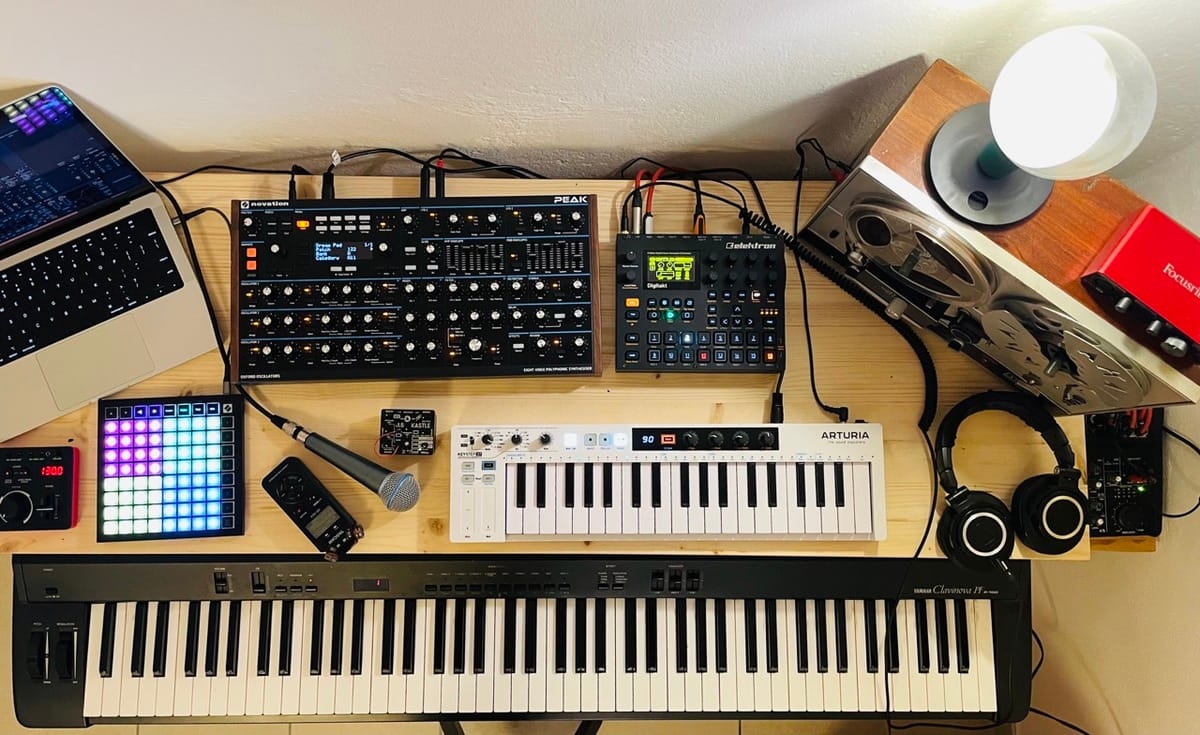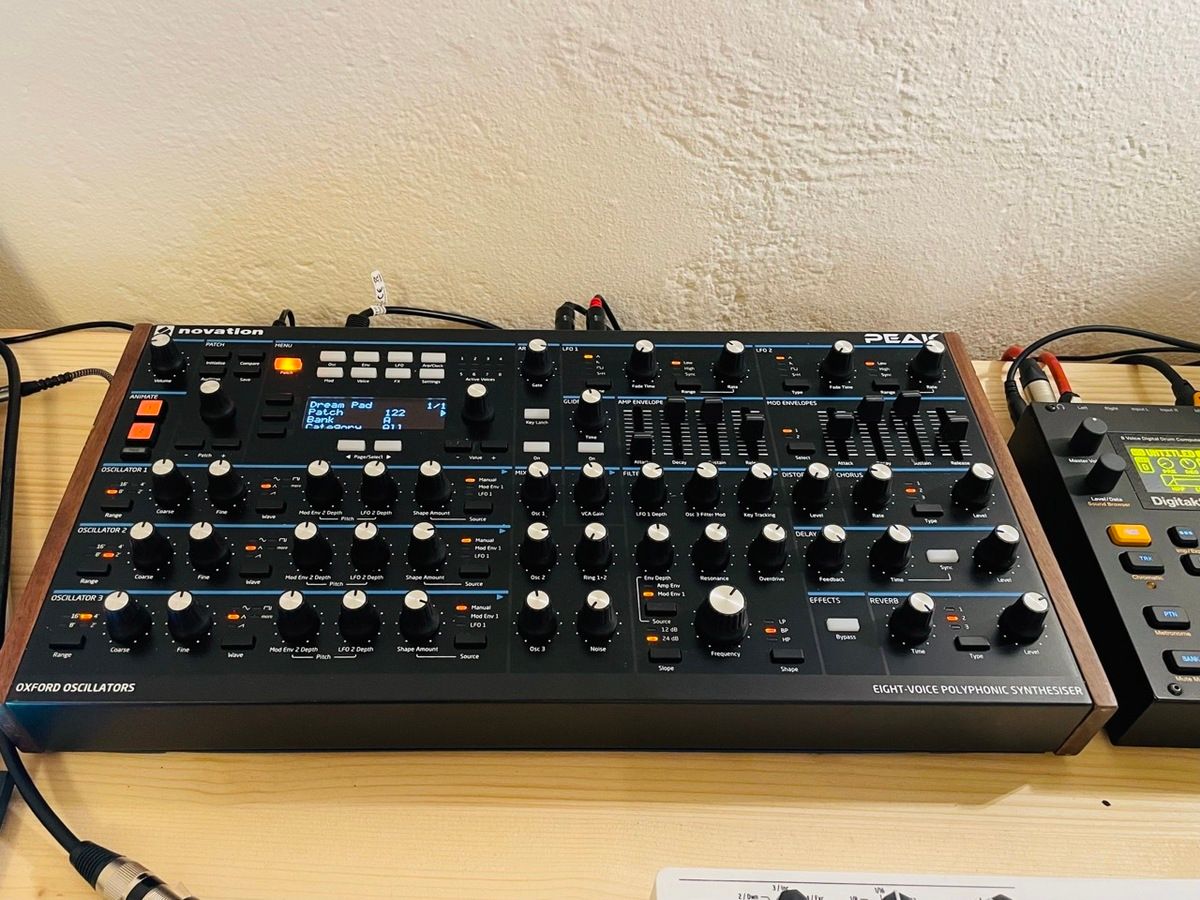- G.A.S. Newsletter
- Posts
- 74 - s-now
74 - s-now

Artist Interviews 🎶 Studio Tours 🎛
Hello music people 👋
Today in the spotlight, s-now
Coming from Italy, after playing in various bands for a few years, he quit music but rediscovered his passion during the COVID-19 lockdown by experimenting with a Digitone 🎶
Read Time: 12 minutes 📰
Studio








Gear List
This issue is brought to you by
FL Presets Newsletter | Free FL Studio presets delivered weekly.
Join 5,000 FL Studio power users and receive the best FL Studio presets.
Interview
Who are you and what is your relationship with music?
Hello, my name is Emanuele, although I go by the artist name s-now.
I was born and raised in the north of Italy, where I still reside today. Music has always been a part of my life, and I began playing keyboards and piano in various cover bands in my city when I was 18 years old. We played a variety of genres, including rock, rhythm&blues and ska but after a few years I quit completely.
After almost 30 years away from making music, I found myself curious about the changes in the market and technology. During the strict lockdown, I decided to dive back into music making and purchased a used Digitone. With lots of free time on my hands, I was able to experiment with sequencers, effects, and digital sounds and I discovered a whole new way of producing music.
It was a rebirth, a rediscovery of my passion for music.
Although I work full-time as a software developer, making music has become a great hobby of mine. Whenever I have some free time, I enjoy sitting in my studio and composing something new, whether it’s just a simple loop or a full track.
I’m always learning and improving but I plan to keep it as a hobby for now. It’s a great outlet for me, and who knows, maybe I’ll release an album in the future.
Which piece of equipment in your studio is essential to your production process?
The Elektron Digitakt!
When I first bought it, I have to admit it wasn’t love at first sight. As someone who had never used a sampler before, I struggled to create anything musical with it in the first few weeks. In fact, I was tempted to resell it altogether. However, with the help of some YouTube tutorials and a bit of reading on the theory of sampling, I began to appreciate the unique possibilities that the Digitakt offers.
Week after week, my confidence grew and I started to fall in love with the possibilities it provided. Today, the Digitakt has become the central piece of my setup, and I can’t imagine making music without it. It just goes to show that sometimes, the things we don’t initially love can surprise us in the end and become essential parts of our creative journey.
What is the least expensive piece of gear that gave you the most results?
The Tascam DR-05X has been an invaluable addition to my music-making setup.
As someone who loves using a sampler, I’ve discovered that the best and most enjoyable way to collect samples is by using a field recorder to capture them.
The DR-05X allows me to capture all sorts of sounds, from everyday noises to more unusual sounds in my environment, and turn them into unique and interesting samples.
I’ve found that using field recordings not only adds a layer of authenticity to my music but also helps me to stay connected to the world around me and find inspiration in unexpected places.
Walk us through your process for creating and producing music.
When it comes to my creative process, I find that I’m usually inspired by sounds. Whenever I come across a sound that captures my attention, whether it’s a bassline, melody, or percussive pattern or just a noise, I start creating a loop with that sound.
Once I’ve created a loop, I leave it for a while and return to it the following day. If it still captures my attention (sometimes it doesn’t 😊), I begin refining it, adding more layers and instruments until it becomes a rough track. This process is iterative, on each iteration, I have the opportunity to either throw everything away or to continue building on the same idea, digging deeper into the details.
When I’m happy with the raw version, I start focusing on refining the arrangement and transitions until the track feels complete. However, even at this stage, I still have the option to make significant changes or even start over.
Overall, my creative process is both flexible and iterative, and I enjoy the freedom it provides me to experiment and explore different musical ideas without worrying to much on the deadline.
What is a production technique that you always come back to?
There are two things I enjoy doing when producing tracks.
Firstly, I strive to avoid making them sound too robotic by subtly shifting notes and trigs off-time to create a more organic feel. Secondly, I like to dedicate a track solely for effects where I experiment with glitch sounds, ghost notes, special effects, and white noise to create an underlying texture behind the main track. This same track also serves as a tool for creating a drop-off in the song, adding an extra layer of depth and interest to the overall composition.
How would you explain your style?
Although I’ve been creating music for some time now, I still don’t have a specific style that characterizes my work. If I had to define it, I would say that my music falls somewhere between dub, minimal and techno, but I’m always experimenting and exploring different genres to push myself out of my comfort zone and learn something new.
For me, the creative process is all about experimentation and exploration, and I find that working across different genres helps me to develop new techniques and approaches to music-making.
Sometimes, I’ll start with a specific genre in mind, but as I work on a track, it may evolve and take on a different character entirely.
What is a big challenge you have as an artist?
For me, being a true artist means more than just throwing some sounds into a groovebox and tweaking knobs until something emerges.
While I certainly enjoy the spontaneity and experimentation of this approach, I’m also eager to develop a more deliberate, conscious method for creating music. To that end, I’ve been reading books on music production and studying the techniques of other producers through videos and interviews.
By learning more about the theory and practice of music-making, I hope to develop a more structured approach to my creative process that allows me to channel my ideas and impulses in a more intentional way.
Ultimately, I believe that the mark of a true artist is the ability to balance spontaneity and structure, to create with both intuition and intention.
Has building a hardware setup changed your perspective on music or life in general?
As a software developer who spends much of my day in front of a computer screen, I find that I crave a more tactile and physical form of creative expression in my free time. That’s why I’ve gravitated towards using hardware gear for my music-making.
There’s a unique physicality to manipulating sounds, building sequences, and applying effects with physical knobs and buttons that simply can’t be replicated by digital interfaces. While software and VSTs certainly have their place in the world of music production (and I love Ableton), for me there’s something special about the hands-on experience of using real synthesisers, drum machines, and samplers.
Not only does this approach provide a refreshing break from the world of software development, but it also allows me to explore new sounds and creative possibilities in a more intuitive and organic way. With my hardware setup, I feel like I’m engaging in a truly hands-on form of art that is both rewarding and fulfilling.
One tip on how to spark creativity?
One of the most valuable things I’ve learned as a music producer is the importance of listening to other artists and producers, even if their music isn’t necessarily my preferred genre or style. By taking the time to study their techniques and approach to composition, I’m able to gain a deeper understanding of music production as a whole and expand my own creative toolkit.
Whether it’s watching interviews with established producers, attending live performances, or simply exploring new artists on streaming platforms, there’s always something to be learned by listening to the work of others. By paying close attention to the ways in which they use instruments, effects, and sequencing techniques to create their unique sounds, I’m able to discover new ways of approaching my own music-making process and incorporate fresh ideas into my work.
Of course, this doesn’t mean that I’m constantly trying to imitate other producers or create music that sounds exactly like theirs. Rather, I see it as a way to broaden my own musical horizons and challenge myself to step outside of my comfort zone and experiment with new sounds and styles. By listening to and learning from others, I’m able to push my own boundaries as a producer and continue to grow and evolve as an artist.
A book, movie, article, or album that has inspired you?
A book: Electronic and Experimental Music: Technology, Music, and Culture by Thom Holmes
Anything else you'd like to say?
One tip: establishing a regular practice routine can be a crucial step towards learning and improving a new skill.
Setting aside a specific time slot, even if it’s just fifteen minutes or half an hour every day, to devote to your music-making can help you build consistency and progress steadily over time.
Where can people find more of your music and connect with you online?
In Case You Missed It
For jams, knob-twists and pad hitting videos go to G.A.S. Instagram
Do you know someone who would like this email? Forward it to them 📤 💗
Commissions may be earned from the links above

Giannis @giannis.kampiotis

Reply